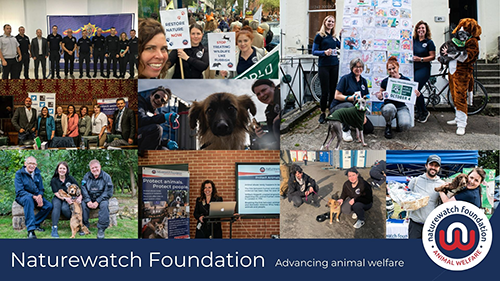Naturewatch Foundation
Bolstering the police response to reports of wildlife crime
Naturewatch Foundation (NWF) aims to end animal cruelty and advance animal welfare standards through campaigning and raising awareness. It knew there were issues when people reported barbaric wildlife crime, such as badger baiting, to the police staff who controlled response allocation. A call was often met with the inaccurate response of: “this is an RSPCA issue, not us”, or crime reports were regularly emailed on to wildlife crime teams without checks on availability or ability to attend in a timely manner.
 This resulted in anger from the public, and a feeling that police were unwilling to deal with wildlife crime. However, police officers on the ground were equally as frustrated, as they wanted to attend jobs quickly. A solution was required to improve the ever-deteriorating response rate and public perceptions of wildlife policing.
This resulted in anger from the public, and a feeling that police were unwilling to deal with wildlife crime. However, police officers on the ground were equally as frustrated, as they wanted to attend jobs quickly. A solution was required to improve the ever-deteriorating response rate and public perceptions of wildlife policing.
NWF needed to deliver a method that would have a genuine impact without wasting valuable working time, and it needed to factor in operational risk assessments as some of the crimes are committed by violent and organised criminals.
It created an animated training package called FCR (Force Control Room) Wildlife Crime, lasting 19 minutes, covering seven crimes including hare coursing, bird of prey crime, and illegal hunting with hounds. NWF knew the latter would be a contentious issue, but with the full backing of policing, decided it was a vital one to tackle to regain public confidence.
Since launching in August 2023, the training has reached over 4,500 police staff members covering 93% of police forces across England and Wales. NWF calculates it has cost only £1.34 per person, and says there has been invaluable return on investment (ROI) in terms of geographical reach, members of the public positively impacted, and, ultimately, the numbers of animals benefited. The project has little to no ongoing costs, and therefore ROI will only increase over time.
Charity Awards judge Chris Sherwood, chief executive of RSPCA, said the work was hugely important, because it has historically been very difficult to secure prosecutions on wildlife crime. He explained that rather than there being just one act of parliament covering treatment of wild animals, as there is for domestic ones, there is a plethora of complex and inconsistent legislation which makes it almost impossible to secure convictions.
CC Reg no. 1039679
